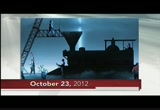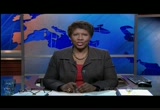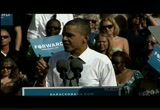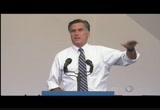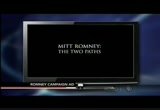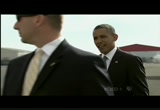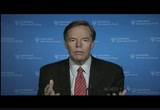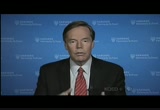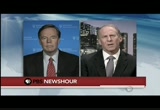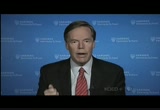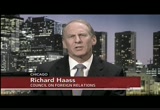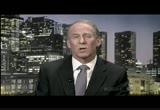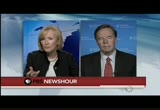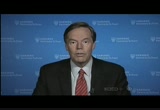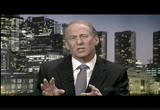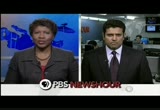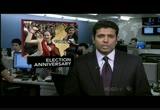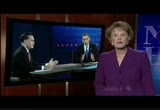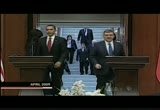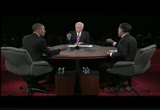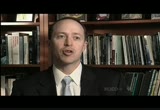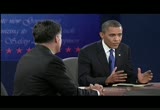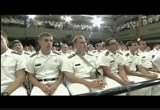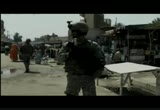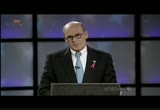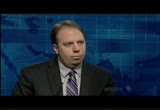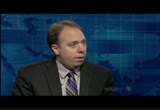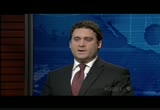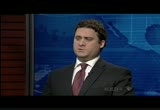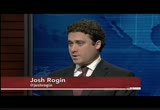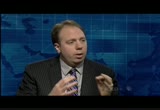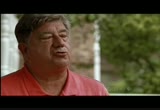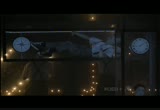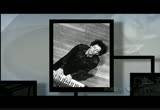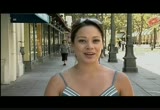tv PBS News Hour PBS October 24, 2012 12:00am-1:00am PDT
12:00 am
captioning sponsored by macneil/lehrer productions >> woodruff: it's a two-week sprint to election day after the final presidential bate last night. good evening. i'm judy woodruff. >> ifill: and i'm gwen ifill.a on the newshour tonight, we wrap up today's rallies in swing states, and talk with nicholas burns and richard haas about what the candidates have and haven't said about foreign policy. >> woodruff: then, margaret warner examines the charges and counter-charges made in the final face-off. >> ifill: our next battleground dispatch comes fromouthern virginia, where voters are
12:01 am
worried about what federal budget cuts would do to the defense indfrtry.tr roads region might not be ablro to define see questions traition but with the largest military concentration in m the country they kw bi cuts to defen me the lo of lots ofobs. c2 >> woodruf and jeffrey brown talkto composer philip glass ob his genre-ben opera out albert einstei >> the amazing thing is that what you see, almost everything you see has been talked about. if you look at the stage you're looking at the furniture of your imagination. >> woodruff: that's all aheadn tonight' newshour. major funding for the pbs newshour has been provided by: c2 ur
12:02 am
>> sic is a univers languec2 c2t wi wain an acci i c2worrie the health ce em spo a lang all itsc2 c2 with uniteth cre i got lp th fit lifec2 infortion o one.c2 c2nnection too ctor too t c2ere i'm from an toolsls toto eimate w my cre co so i never miss a t.c2 >> wee more t 78,0 people looking out for more than 70 million americans. that's health in numbers. united health care. >> viking river cruises. exploring the world in comfort. and by the alfred p. sloan foundation. supporting sence, technology, and improved economicng ncialrmance and fi literacy in the 21st century.d
12:03 am
and with the ongoing sup rt of these institutions and foundations. and... this program was made possible by the corporation forrt public broadcasting. and by contributions to your pbs station from viewers like you. thank you. >> ifill: the presidential candidates beat a path to battleground states today, starting an all-out push to the election. it marked the beginning of the endgame, with 14 days to go. the debates are over but the campaign is picking up steam. president obama and mtt romney wasted no timendoday gettingo back out on the campaign trail. with election day now only two weeks awayng the candidates are devoting every waking minute to revving up the base and courting any remaining undecided vayters in a handful of critical swing
12:04 am
states. for mr. obama this morning, that met the campaign rally before an enthusiastic crowd in delray beach, florida, not far from the night'stof last face-off. >> you ys really arys fired up. ifill: picking up where he left off last night he fold voters th governor romney is not a reliale choice. >> we'reelccustomed to seeingto politicians change their itsitions from like four years ago. we are not accustomed to seeing politicians change their position from four days ago. i mean,... and we joke about romnesia but you know what? this is is important. this is about trust. there is no more serious issue presidential campaign than t trust. >> ifill: doubling down on that argument vice president joe biden amplified the democrats'
12:05 am
message at the university ofie toledo in ohio before meeting up with theresident later in the day for a joint rally in dayton. mitt romney headedth west for a jot rally of his own with running mate congressman paul ryan. the two told a roaring crowd in henderson, nevada, the president does not deserve a second term. >> can you afford four more years 23 million americans looking for a good job? >> no! can you afford four more years with housing prices going down along they bottom? >> no. can you afford four more years of doubling of the gasoline prices you're paying? >> no! how about this instead. would you le to have four years where we create 12 million new jobs? >> yes! how about four years, how about four years where we're able to see rising take-home pay again? >> ifill: both campaigns
12:06 am
capitalized on their final debate by focusedded mostly on foreign policy. much of that in the greater middle east. seated arm's length from mr. romney the president repeatedly accused his republican challenger of changing his positions out of political expedience. >> you said that first we should not have a time line in afghanistan. then you said we should. noneyou saymaybe. or it depends. which means not only were you wrong but you were also confusing and sending mixed messages both to our troops and our allies. what we need to do with respect to the middle east is strong, steady leadership. not wrong and reckles leadership thatkl is all over te map. unfortunately that's the kind of opinions that you've offered throughout this campaign. >> ifill: governor romney said he agrees with many of the president's actions in syria, egypt, afghanistan and pakistan. but those policies, he said, have not been well executed. >> you look at the record ofhe last four years and say, is iran
12:07 am
closer to a bomb? yes. is the middle east in o tumult? yes. is al qaeda on the run on its heels? no. our israelnd the palestinians closer to reaching a peacea agreement? no, they haven't had talks in two years. not seen the progress we need to have. i'm convinced that with strong leadership and an effort to build a strategy based upon helping these nations reject extremism, we can see the kind of peace and prosperity the world demands. >> ifill: turng to the final stretch, the two campaigns t released a influenceyf television advertising to drive their points home. governor room knee'sf ads returned to the debate stage. >> america is going to come back. for that to happen, we're going to have a president who can work across the aisle. i'll work with you. i'll lead you in an open and honest way. and i ask for your vote. i'd like to be the next president of the united states to support and help this great nation. >> ifill: the president's advertising also focused on the
12:08 am
thoice voterso face. >> read my plan. compare it to governor romney's and decide which is better for you. it's an honor to be your president. i'm asking for your vote. so together we can keep moving america forward. >> ifill: from here, it's a sprint to november 6. following his afternoon rally, romney headed to colorado. and then back to nevada. and on to iowa tomorrow. the president spends the next two days hittingight states: iowa, colorado, nevada, florida, virginia, illinois, and ohio as well as burbank california for an apearance on the tonightce show. >> woodruff: for more on last night >> woodruff: for more on last night's debate, we turn again to two experts on foreign policy- richard haas, president of then council on foreign relatns. he's in chicago.n and in boston, former u.s. diplomat nicholas burns, now with the kennedy school of government at harvard university. welcome to
12:09 am
you both. let me just ask you tstart broadly speaking. what do we take away from last night's debate in terms of how well these two candidates understand american foreign policy and would be a good steward of it? let me start with you. nick burns >> well, judy, this may sound startling to say in our present red-blue divided partisan environment but i think we have two impressive people running for president. there botht knowledgeable. they're both very smart about the issues. both of them have been successful in nearly everything they've tried in tir professional lives. president obama was clearly the more knowledgeableir and nuanced and even some's tketed in the way he describedded the challenges to us on the foreign policy and national security landscape. i thought that governor romney had a very strong moment in the debate, a very good moment when he tied together our domestic economy and our ability to sustain a strong military and a strong diplomacy overseas. he said in effect that if we have a failing economy at home we won't be able to afford a first-rate foreign policy. but i also think that this dete showed last nigow that there are very clear differences
12:10 am
between those two despite, you know, the drift of governor room knee to the center last night. they have different life experiences and different world views. governor room knee there's a quality to t way he talkshe about foreign policy, it's more back to the future, restore american leadership, american greatness. president obama, i think recognizing the reality that we're operating in an era of limits that we are pressed financially,o you saw ino libya in 2011 he pushed brita and france out to leadership of that nato operation tond take down colonel kadafy. so very diffent world views. i thiif all a the agreement last ght shouldn't mask the fact that we have a real choice ong november 6. >> woodruff: richard haas, how do you size up the two after last night? and how do you see those differences? >> well, actually i thought the sim layers were greater than the differences. thato me was in some ways theth most striking part of the debate. both also, as ambassador burns pointed out, emphasized the integral, the close linkage
12:11 am
between what we want to do abroad and what it is we're doing here at home, that essentially foreign policy can only be successful abroad if we have the resource space and if we can set an example to the world. both of them emphasized that point. ey both als emphasized a a lot the middle east. there i thought what was interesting wasn't so much what they do but what they wouldn't do. both candidates talked about the limits to the american involvement, say, in syria. they talked about the problems of a pakistan and the challenges of dealing with the muslim brotherhood-led egypt but it wasn't again clear to me listening to what exactly they would do to t keep things n the rails or if things went off the ails. >> woodruff: nick burns, coming back to the point that both of you have made about theai agreement, what did you make of the agreement that governor romney seemed to have with the president's policies on iran, on when to lead to afghanistan, on egypt, on drones and especially compared with some of the language we've been hearing from governor room knee earlier in
12:12 am
the campaign? >> i found it surprising. i can't calculate the politics of this. it may be good politics for him in those battle ground states but in foreign policy i think what most people opuld be looking for, most of us arel looking for, is someone with core values, someone with a coherent and compelling world view, and someone wit a plan t to, you know, sustain american power. it's difficult i think now for governor romney because he'san campaigned for the last two years through all those republican bates he had very different positions than last night on iran, on afghanistan,ba on iraq and on russia. the are some of the biggest challenges ahead of usso in 2013 and '14. i think this does get to credibility. i think he hurt himself last night in trying to be something that he has notn been: very consistently in the campaign trail. on the other hand, i think what you saw from president obama is someone with a fairly impressive international record of
12:13 am
accomplishments in his first term and a very clear difference, i think, in where he would take us on some of those issues than governor romney in a second term. >> woodruff: richard as, how did you read the, i guess, the difference between thas ameeemet of what we heard last night from governor romney, the criticism in the past, and how do you square when governor romney says he believes u.s. foreign policy is unraveling under this president but then he proceeds, as he said, to agree with himn a number of points.n >> well as richard nixon i think it was who said when you run for the nomination you've got to tack more towards the end zones. when you're in the general election you've got to head towards the middle of the field. none of that should surprise anybody. i also think incumbents have a certain structural advantage. they've been wrestling with national security challenges for four years. someone who is a governor who hasn't been a senator on the foreign relations committee is always going to have, i think, certain disadvantages. with that said, the president also has problems of consistency. i don't think he did a good job
12:14 am
last night in explaining his iraq policy. about why it was the united states did not leave a residual force there. also when you look at the middle east, i'll be honest with you, dy, i don't think you can have a policy of consistency. the united states gets involved to get rid of colonel kadafyin libya. on the other hand more than 30,000 syrians have lost their lives and the united states has largely stood on the side lines. it's not clear what we're going to do if and when there are upheavals in places likein jrda, bahrain or evenaudi arabia. so i'm not sure we have the luxury of consistency. i think what both of them were saying was that the middle east is extraordinarily complex. governor romney said two interesting things i thought. one is that what the united reates did in iraq and afghanistan cannot be a template for the future. thed idea we're going to continue to send hundreds of housands of americans to remake other societies, that's clearly a nonstarter. and then he said -- i think his phrase was -- we can't killho ourselves out of this mess.
12:15 am
there has to be something else dealing with extremism and the muslim and arab world other than simply traditional counterterrorism and drone attacks. there has to be something larger to try to encourage the evolution of these societies so essentially young men don't make the career choice of becoming terrorists. i think that's a big idea. it's easier to articulate than implement it but i think again to me it's a welcome add toyingh to thegs dehete. >> woodruff: what about those two points, nickte burns and wht didn't you hear picking up on something you said a minute ago. wh have you not heard now from these two men that voters should want to know before ey go to the polls? >> well, i guess i disage that it doesn't matteris somehow that someone chges their positions. to me it matters veryge greatly. it goes to a person's credibility and consistencies. on two issues governor romney called russia our number one adversary. he took that back last night. he belittled sanctions and
12:16 am
president obama's inclination to negotiate with iran. last night he took that back. i think these differences matter. i think the drift by governorl romney is troubling. i would say, judy, what was missing last night was a focus on the real difficult challenges that our next president is going to have no matter who is elected. on iran, are we going to seek to negotiate a very difficult compromise with irano short of the use of force or are we going to choose the use of force perhaps with israel to stop them short? on the other hand we'reoing to have to also decide what to doo about china and how to handle this very difficult balancing act where a major trade partner of china, but we have profound political and economic differences with them in east asia. there was none of that last night. the real difficult challenges that the next president will have to embrace. >> woodruff: rhard haas, quickly on what has not been talked about and what about the russia point that rick burns just made? >> well, countries like russia, china and many others, you'rei
12:17 am
going to have thisy ralt where they're not going to be clearly adversaries. they're clearly not going to be allies. it's going to be in between. this is going to be an era where nimble foreign policy is going to be the order of the day. what we didn't hear about what, say, anything about mexico or really latin america, about africa, about climate change, about japan. more broadly about asia. they talked about china but asia is getting in some ways, quote unquote, interesting again. in some ways it reminds me of europe of areentury ago where a lot of countries are begin to go get more atiff in their foreign policies. you don't have the regional institutions. you don't yet have the reconcilitiion of past frictions. ihunch is the new president will not have to deal simply with all the obvious challenges of the greater middle east we have come to know. my hunch is they're going to have to deal with all the problems of asian pacific as well as the lingering challenge of thee euro zone problem. it will be e a full foreign pocy in-box for whoever is elected. >> woodruff: fascinating. i don't think much more we're going to hear about foreign
12:18 am
policy becyeen now and the election. we did hear about it last nighte thank you both for sharing your thoughts with us this evening. tnk you both. >> thanknk you. >> woodruff: and we have other views online. gideon rose, editor of "foreign affairs" magazine, writes about what a romney or obama win could mean for the future of u.s. foreign relations. that's in the rundown. >> ifill: still to come on the newshour, assessi the facts ines orryingght's debate; about defense cuts in virginia; and reviving an unconventional opera. but first, with the other news of the day, here's hari sreenivasan. >> sreenivasan: wall street had one of its worst days of the year after a series of disappointing earnings reports from the likes of dupont, xerox, and ups.at the w jones industrial average lost 243 points to close at 13,102. the nasdaq fell 26 points to close at 2990.th the country where the arab spring began, tunisia, marked an anniversary today with rival monstrations. it's been one year since an islamist party took powein tunisia's first electipo since a longtime dictator was ousted.
12:19 am
pro- and anti-government supporters gathered today outside the national assembly building in tunis. they waved signs and chanted slogans at one another. we are here to celebrate the first election of the constituent assembly, the first time in the history of tunisia. the day is considered as the second independence. the first time the s tunisian people practicedded the election in a transparent way with the world as a witness. >> sreenivasan: opposition lawmakers boycotted a special legislative session marking the anniversary they accused the islamist government of failing to achieve the revolution's goals of "jobs, freedom, and dignity." the emir of qatar made a landmark trip to gaza today. the first visit by anyit head of state since hamas seized control there five years ago. gazans lined the mn road ton gaza city, as the emir waved at them from his car. he also met with hamas leaders and urged them to reconcile with the rival fatah faction, which rules the west bank. israel maintains a sea blockade of gaza, but qatar has promised to deliver hundreds of million
12:20 am
dollars in aid by land route through egypt. those are some of the day's major stories. now, back to judy. >> woodruff: and we return to the final presidential debe with a closer look at thee arguable statements made by both candidates. margaret warner has our report. >> warner: last night's final presidential debate took on a lo questions. and the answers at times raised further questions. as we did last week, today we reviewed some of what was said eand how itan match the t recor. starting with mitt romney's charge that from the beginning of his term, president obama was apologizing overseas for america's actions. >> the president began what i've called an apology tour by going to various nations in the mide east and criticizing america. i think they look at that and saw weakness. >> nothing governor romney just said istrue. starting with this notion of me apologizing. this has been probably the biggest whooper that's been told during the course of this campaign. fact-checker and every
12:21 am
reporter es looked at it. the governor has said this is not true. >> mr. president, the reason i tell it anl apology tour is because you went to the middle east and you flew to egypt a and to saudi arabia and to turkey and iraq and then in those nations and on arabic tv you said arica had been smissive. you said america had dictated other nations. mr. president, america has not dictated other nations. we ve freed other nations fromed dictators. >> mr. obama never used the words apology or apologize in his early trips abroad including one to europe, turkey and iraq in april of 2009. romney appeared to be quo ng what the president said on that trip during a stop in france about fricti between the united states and europe. >> instead of celebrating your dynamic union and seeking to partner with you to meet common challenges, there have been times where america has shown
12:22 am
arrogance and been dismissive, even derisive. europe, there is an anti-americanism that is at once casual but can also be insidious instead of recognizing the good that america so often does in the world, there have been times where europeans choose to blame america for much of what's bad. >> warner: two months later in egypt, the president did voi regret for some bush administration actions in the post v/11 war on terror. >> 9/11 was an enormous tarauma to our country. the fear and anger that it provoked was understandable, but in some cases it led us to act ontrary to our traditions and our ideals. we are taking concrete actions to change
12:23 am
course. >> thereas definitely no apology.as >> warner: karen bowham then a nhite house correspondent for reuters on one of the trips said president obama was trying to reach out to the muslim world and signal a break from the bush years. >> president bush was very uopular in the muslimop world. he wanted to turn the page guantanamo bay, on the iraq war, on all of the things that had given the united states a negative image in the muslim world. >> warner: defense spending was another point of contention. president obama stood behind his pentagon spending record and dismissed romney's call for more. >> he then wants to spend another $2 trillion on military spending that our military is not asking for. now, keep in mind that our military spending has gone up every singleyear that i've been in office. >> warner: today todd harrison of the center for strategic and budgetary assessments said mr. obama is right about
12:24 am
governor romney's spending proposals. >> the $2 trillion figure, that's based on governor romney's plan to gradually increase defense spending to 4% of gross domestic product,ye g.d.p. if you do that over a four-year presidential term that will cost $2rillion more than what rie president has proposed sending on the department of defense. so that part is true. >> warner: but he said the president's own dense spending record is more complicated to assess. >> now, the president also said that he hasenncreased his defense budget every year sinced he's been in office. that'sot exactly right. the president has proposed increases in defenseapending each year. but inp 2011 and in 2012 congres cut what the president proposed. each year they cut more than $20 billion out of the defense budget request. so as a result when you adjust for inflation, defense spending has actually gone down in the past twoo years.c2 >> warner: as part of that argument, the candidates also clashed over e navy. in one of the debates more
quote
12:25 am
talked about exchanges. >> our navy is smaller now than any time since 1917. the navy said they needed 313 ships to carry out their mission. we're down 285. that's unacceptable to me.
12:26 am
than we are now. we've been increasing the size of the navy under president obama. but moreover i think this was the president's point in the debate about horses and bayonets is that it's
12:27 am
the president charged romney is trying to have it both ways. >> you say that yore not interested in duplicating what happened i iraq. but just a few weeks ago you said you think we should have more troops in iraq right now. >> warner: that was believed to be a reference to romney's address at the virginia military institute earlier this month. >> america's ability to influence events for better in iraq has been undermined by the abrupt withdrawal of our entire troop presence. >> warner: romney did not say v.m.i. that u.s. troops should still be in iraq. but at a secretly taped fund-raiser last may the video shows romney said this. >> this president's failures put in place an agreement allowing 10,000-20,000 troops to stay in iraq. unthinkable. >> warner: romney said that mr. obama also had wanted to keep troops in iraq. but could not g baghdad to guarantee them legal immunity. >> there was an effort on the part of the president to have a status of forces agreement. i concurred with that and said
12:28 am
we should some number of troops stay on. that was something i concurred with. that was your posture and mine as well. you th ght it should have been 5,000 troops. i thought it should have been s more troops. the answer was we got no troops whatsoever. >> just a few weeks ago you indicated that we should still have troops in iraq. >> i'm sorry. i indicated... >> warner: last november, joint chiefs chairman martin dempsey told a senate committee the obama administration wanted to keep about 3,000 troops in iraq if there had been a status of fores agreement. you can watch the entire debate on our home >> woodruff: you can watch the entire debate on our home page,r and find our analysis there, too. >> ifill: another topic raised last night: the cost of slashing the federal government. congress agreed to deep across- the-board cuts-- known as sequestration-- as part of a deal to raise the nation's borrowing capacity. but president obama said those
12:29 am
cuts, which would kick in january 1, are avoidable. >> first of all it is not something that i proposed. it's somhing that congress has s proposed. it will not happen. the budget that we're talking about is not reducing our military spending. it's maintaining it. >> woodruff: it is up to congress in the lame duck session after the election to resolve the issue of see questions traition. but the prospect of those cuts, in pticular for defense, has some voters worried , especially those who live in southeastern virginiin that area, with its large military population, is focused on how the cuts would affect the local ecomy. our story comes from cathy lewis of whro in hampton roads and is part of our new collaboration with public media partners across the country. we're bringing you reports from areas that will likely dictate the outcome of the election in a series we call battleground dispatches. >> are you aware of the term sequestration? >> no. are you familiar with the
12:30 am
terminolo sequestration? >> say again. reporter: people here in the hampton roads region might not be able to define sequestration litaryli the largest concentration in the country they know big cuts to defense means the loss f lots off jobs. >> you've lost a lot of work. you're going to put a lot of people out of work. most people work with navy vessels. if you cut the government spending you're cuttingu jobs. that's going to trickle on down to where the people aren't working, they're not spending the money out in the economy. >> reporter: 6% of the population here wears a military uniform. another 40% work in businesses that support them. >> we have the navy down here. if they cut back, that would hurt the economy a lot. >> reporter: with the drawdown of military operations in iraq and afghanistan, defense spending will already be shrinking. but without congressional action the automatic cuts scheduled in january by sequestration will
12:31 am
cost virginia more than 200,000 jobs, most of them in defense.ef >> we have an aircraft carrier to go under construction next year. the kennedy. we have a carrier to be refuel that would go under contract next year. we have a carrier to be inactivatedded the enterprise would go under contract next year. we have another block of submarines to go under contract in the next year or so. >> reporter: mike pette is a native area and president and ceo of huntington inkals, the parent company of newport news shipbuilding. they're virginia's largest industrial employer and the only shipyard in the nation that can build nuclear powered aircraft carriers or as they're known around here 90,000 ts of diplomacy. their contracts are safe for the moment but their future is less certain. >> the debate that's going on around budget sequestration as far as our company is concerned is really what does this business look like five years from now because it will be future work that might have to be moved around or shifted
12:32 am
around that would be work we would e doing in the five- tou ten-year time frame. >> reporter: petters is also cocerned about the pact ofpa cuts on his suppliers. >> we have 5,000 suppliers in all 50 states. those folks are sitting there loking at what are the orders that are coming out of the businesskiow? what are the investments we need to make in our work force and in our facilities to support the next level of navy shipbuilding? >> reporter: military contracts oen look at least five years ahead because it takes a long time to build things like ships and submarines. >> the politics are interesting. the election is important.en i encourage everybody to participate but when it comes to our business, the things that we do, we're doing for the president after next. >> reporter: quinten kidd is a professor of public policy at the university. >> whether you're in the military or not in hampton roads you're aware of th impact of the military's spe iing in hampton roads. you're aware of the potential devastating impact of cuts
12:33 am
either slow cuts or dramatici cuts. >> reporter: in this battle ground state the issue is on the minds of voters eyeing close races for the house, senate and white house. president obama and former governor mitt romney's campaigns have devoted time and money here in hopes of securing its 13 electoral votes. both candidates have made repeated visits to the region. in fact it was here along this working waterfront lined with military vessels where governor romney introduced his running mate to the nation. in the closely watched race forv seatecond district here, a that has switched parties twice in recent years, republican congressman has had to defend his votes for t automatic cuts that were part of the resolution to the debt ceiling stalemate last year and argues they have since worked in the house to protect defense spending from being cut. >> i think we need to remember that we are right at the precipice of an economic serious situation because of reaching the debt limit. we've acted and led.
12:34 am
i actually amended the natnal defense authorization act with an amendment that would stop sequesttion if it would be acted upon insttheth senate. >> reporter: his democratic opponent is a successful entrepreneur andn phila thropist. hi says he wouldn't haveed vothe for the debt deal at v triggers the cuts but would have pushed for other cost-cutting strategies like negotiating for better medicare drug prices and ending tax cuts for those makin more than a million dollars. >> it's going to take dproms. that's not a dirty word when it comes to making sure that we don't hurt and cripple our economy in hampton roads.oa >> reporter: the automatic cuts are not a sure thing if congress in a lame duck session can come to an agreement. each side is using the spat to make political points. democrats denoced the cutsde calling for more revenue by taxing the wealthy and republicans are proposing to undo the defense cuts or swap them with further reductions in other parts of the budget. but their prospects are cause for real concerns in this state which is home to 20 major
12:35 am
military installations. >> we still have a little bit of time between the election and the first of january where we may find a compromise worked out. if so, they've waed an awfully long time andwa caused people a lot of heart burn to get to thau compromise. >> reporter: which explains w voters here are as interested in what happens after the election as they are in what happens on november 6. >> ifill: how did we >> ifill: so how did we get to this pass, and what happens next? to help us sort that out, we're joined by steven dennis, who covers the white house for roll call newspaper and josh rogin, a o aff writer with foreign policy magazine and the author of the cable blog. how did we get to this path? the president said it was really congress that did this and some people said no the white house had a role. how did we get to this. >> a lot of folks were shaking their heads wondering what he was sayng because the reality is the president was bnvolved. he helped craft this deal. this sequestration is really a symptom of washington's failure
12:36 am
to get a budget deal. for 18 months the two sides have been squaring off and the the democrats are off in their corner saying we nd to raise taxes on the wealthy. the republicans are saying we have to havewe cuts-only plan. when they cut this deal a year-and-a-half ago, it was designed to bring the two parties together, to make it s onerous that both sides had to come... >> ifill: nobody thought it would ever be real. >> yeah. i think that basically the idea was the super committee was going to take a crack at coming up with an alternative. they failed. and since then neither party has really, you know, there hasn't been much in the way of talks a the high level. there have been a lot of hind-the-scenes talks and hiere's a lot of optimism in recent weeks at the sort of staff level and members of congress trying to come up with some kind of compromise. reality is when something in congress nobody wants the democrats don't want these cuts, the republicans don't want these cuts. the presidentn'doesn'do want the cuts. chances are these cuts aren't ful going to take place.
12:37 am
>> ifill: let's assume for ag moment that nothing happens, what would happen at the pentagon? what would happen in defense if effect?ts were to take how many jobs, for instance, wld be affected? >> sure. it's important to know that none of this is set in stone. what we're talking' here are cuts in the fiscal 2013 budget and beyond. what the pentagon does is budget this advance. on january 2, nothing actuallyne changes. the pentagon and its contractors are working based on last year's contracts, obligated funds, and this surrounds the whole controversy of when contractors would be forced to cut workers, issue lay-off notices because on january 2, nothing actually kicks-o in. then begins the process of figuring out how these cuts, again, spread out over ten years cuts from projected budge hes not actual budge hes, cpothetical budgets even would then be implemented through the program. >> ifill: mitt romney has been saying on the campaign trail with presumably is what the president referred to last
12:38 am
night, this guy is going to cut the navy. he's going to make t us weak wia these cuts that he has endorsed. >> right. there's two things that mitt romney said which i think don't have a a lot of analytical basis. he said $1 trillion in cuts. wees conflating the sequestration cuts with savings over ten years that the obama administration put into last year's budget. those were savings based on projected budge hes. they didn't cut the level of the budget. the cut is when the number goes down. the second thing that he said is that this would take our 285-ship navy down to the lowav 200s. now again we don't have planning ld mean.ldese cuts w nobody is really shore exactly where the cuts would come. a document mandated by congress in thesequestration transparency act forcedded these administration to outline cuts. whathey did was they eliminated a flat percentage from all the accounts. whidh doesn't lead us to any conclusions about how many ships or hn' many plans or how manyor missiles or how many soldiers would suffer.
12:39 am
it allemains to be seen. >> there have been economic analysis by folks outside and academics who have said that these cuts could lead to the loss of a million jobs on the defense side alone and maybe another million on the other side of sequestration which we haven't talked about much which is on the economic... which is the domestic side. >> ifill: my next question is, this is not just about the military. >> absolutely. every part of the government would be affected. medicare payments to doctors would be cut by 2%. things likeood safety spspectors, the government has warned that f.b.i. agents could be left off. all kinds of thin could happen if this lasts mo than a few weeks. the reality is there is probably some time early in january with the new president, whoever it is, sworn in to deal with thiss situation. and, you know, the thing is that people talk about it being a trillion dollar issue its a ten-year issue. $109 billion next year. if the congress can come together on something li $50 billion, they can kick it
12:40 am
halfway into next year and have time to deal with it in sort of a more rational basis.ti ne ifill: and, but, joshua, other thing that has to happen as you pointed out, plan ahead. these defense contractors plan ahead. these people who a building the planes and the ships plan ahead. don't they have to base their wdget baseed on what they know which is what the deal is? >> right. first let me say i largely agree with everything steven said but again he's are all economic analysts based on possible contingencies. we're going to have two chances to avoid this one on a lame duck session which could o one way if romney is elected andanother way if the president is re-elected. >> ifill: what do you mean. where the democrats maintain control of the senate, we'll have a much longer lame duck with a much greater opportunity for more leverage on the president and more opportunity for revenues to be included in a grand bargain. if the republicans take over it's likely we won't have a very robust lame duck session. either w when the congress comes back in january the w republicans will likely still control the the house. they will likely not implement these cuts one way or the other.
12:41 am
>> ifill: have either of you heard any movement on this? everyone is saying can it possibly happen? but isnything actually going on in briefly are. >> what's interesting is the actual and maybe steven knows this better than i but theth top-level negotiations are dormant. they'rnot going on. nothere's a lot of movemethen te political front. again,nt's in certain people's interest to push thist' issue before the eleion for political purposes. that's why we see a lot of campaigning on this its in the interest of the incumbent to wait until after the election and push this down the road. >> there' a lot of work at the staff level people cominger up with scenarios thi gs like maybe you could take mitt romney's idea of capping deductions for the wementy and use t that to raids a little bit of revenue maybe not bring the rates down to 28 but have them not go up to 39%. >> ifill: there is still some hope somewhere. >> there's some talk and you have a numberse of senate repuficans particularly hawks bike john mccain and lindsey graham who have been pushing their colleagues to compromise. the question is whether house republicans will be willing tore
12:42 am
go. >> ifill: steven dennis, josh rogin, thank you both very much. >> great to be here. ifill: you can find more reporting from >> ifill: you can find more reporting from virginia, and all of our battleground state dispatches, on our web site. >> woodruff: and we turn to a topic not mentioned last night in florida: climate change. it's the first time since 1988 that e major party candidates did not discuss the issue-- orr were not asked about it-- during the debates. many were disappointed that it did not draw attention. n tonight's edition of "frontline explores why attitudes toward climate change have shifted as skeptics have mounted a campaign to undermine the scientific consensus. in this excerpt, frontline correspondent john hockenberrycl looks at how the battles are being fought not just in washington, but at the local leve too. t . >> here in north carolina warning from scientists on sea
12:43 am
level rise would cause politicians to try and lislate chime at change out ofis existence. >> they're here to try to protect these houses. >> reporter: in 2010, 19 scientists on a sta commission warned of a possible sea-level rise by the end of the century. >> here you get an idea of the nature of these. >> reporter: geologist stanley rigs was one of the scientists. >> we were asked to do is to develop what is the history of sea-level rise and what can north carolina expect 25 years from now, 50 years from now, 100 years from now? >> reporter: the report said to expect a 39-inch ocean rise, an3 estimate in the middle of a range consistent with other predictions for the rgion. >> 39 inches.gi if that comes to pass here, everything we'd see. >> this town will be underwater. reporter: the commission's warning was seen as a threat by a coastal economic development group, nc-20. >> now you had the flood from a storm, huicane, whatever, andic
12:44 am
that... >> reporter: tom thompson is the n.oup's chairn. >> they had a dft policy which mandated that everything be designd and constructed to a 39-inch sea-level rise. people that recommended we plan immediately for 39 inches did not understand the economic consequences. >> reporter: thompson is a skeptic himselfftnd fearsn scientists and their warnings more than he fears any climate change. >> you're not worried. i don't believe we'll have a sea-level rise anywhere close to that. i think there are incredible scientists out there saying it is being to decelerate and i think it will. >> rorter: nc-20's website contains a familiar archive of skeptic information. there's a host of sources for people looking to doubt the scientific consensus. people like north carolina n ste representative bill cook. >> who do you rely on? i rely on whatever size makes good sens.. science makes good sense. >> reporter: do you wa to showh
12:45 am
me? >> this here is one of the sources. this is a book by fred singer d dennis t. avery. >> reporter: what about this book really was meaningful to you? >> well, it's very factual. it tells all the studies and gives you a complete bibliography on who did what kind of study and where it was done and when it was done and how it was done. this book made better sense to me than wat i've seen from nother sources. co-2 is a gas that is used by all these beautiful trees. it's a gooda thing. >> reporr: cook cosponsord a bill to compel north carolina to disregard scientific warnings about climate change. it was written by state senator david rouser. >> well, you know, i don'tok necessarily listen to any one person. i can't take off a whole listlef scientists tha are pro
12:46 am
sea-level rise and a whole list of scientists that aren't. i'm just coming at it from a common sense standpoint. the earth has been warming and oling since dayol one. the effect on sea-level change, what do we know about it? >> porter: the bill would limit authorities to considering historical data in their sea-levelpo projections. the future could only be based on theon past.. >> the problem is, i mean, north carolina beach front are very a close to sea level. you're vulnerable because of hurricane effects. the torm surges and you're tovulnerable because of high tides. those vulnerabilities don't go away becauseyou just legislate themse away. >> reporter: when the bill hit the beaches of north carolina it had become s controversial that the provision disregarding global warming was dropped. but the science was put on hold
12:47 am
for four years. there would have to be a new coast line study. skeptic views would need to be considerd. >> this was a home run. we're going to be involved i hope in taking some of the scieists who come in and do this thing. they were definitely one sided. >> they have a lot to loho if we have to change... >> what they're saying is that le have to include all the nay sayers and all the people who say climate change isn't happening, that sea level isn't rising. be...s going to >> which makes it look like you're just one opinion. >> yeah. which means you've lost? ell, for the moment. there's the tester right there. that ocean will dictate what happens. the ocean is going to win.
12:48 am
>> woodruff: for more on how climate science and politics clash, hari sreenivasan interviewed frontline correspondent john hockenberry. watch the video online. "climate of doubt" airs on most pbs stations tonight. >> ifill: finally tonight, a genre-bending, musical look into the mind of albert einstein. ffrey brown tells the story. c2 bechtour continues tst c2minweekend in berkele c2lifornia, fore hea road to mexico city,c2 amsterd, an kon >> broit's cleeinsteinc2 on t beach. its now receivinrare but there' beach it'sc2 not out eitein at least i ny tritional stortelling sen c2 also clled an opera thou cording to its composer pli glass, that too is up for grabs. >> it's in an opera house. brown: therefore it's an
12:49 am
opera. >> that's not a bad definition. when i loo at the work i've done and people say whichhe are operas and which aren't? i say the ones we hold in opera houses are operas. good definition. >> brown: so what is einstein the beach? it had its premiere in europe in 1976 a then i two sold-o performance t metrolitanc2 operin new yorkei it xes exrial form ofc2 music with scooping arggio th repeatri a ry, dnce,e, theater, and contemporar artc2 into a lon and i mea lo, nely fivee hours -- eents. it's ract without a a story toc2 c2llow or a colollage of ou, mo and i usiciad einstei ing the violi an siers cting numbers, clocks mong forward ac2 backwardc2 >> the azinthing i is that
12:50 am
what you see or almost everything you are thin that eitein talked y a when he was talking aut hisis theorie he tlked out hpacece c2time a trains mog. he talked about clocks. if you look at the stage you're looking at the furniture of his imagination.on >> brown: 36 years ago eineinc2 thrillemany viewers and critics and infuriated others. no one had seen anythinguite like it. its admirers hailed it for tearing down borders between different ors in ways that are still with us today. but for glass and his c2llarator director robert wilson captuin a 1 otogra by rort ethorpe it w t clminio off yearsc2 of workin out ideas and working with other artists. >> we were part of a generation of people who were furiously experimenting with collaboration. it was a great thing of that generation. and still going on today. what we were doing was putting
12:51 am
toget er what he knew and what i knew into something that would be new. but we weren't thinking of a change of the art world at all. we were trying to get through the piece.er we were trying to put it together. >> brown: in fact, einstein on the beach began with a series of drawings done by wilson. each imagining a scene or idea they had discussed. >> you looked at the drawings. simple at that.c2 bro sime tt? yeah. brown: philip glass grew up in baltimore where his father owned a record store with a wide-ranging collection. by age 15 young philip was the unpaid classical music buyer for the store, getting a hands-on education. >> my father took a liking to modern music.si he had records in the store that nobody would listen to. he would take them home to listen to them. hended up in this business. he was a very smart fellow and learned a lot along the way.
12:52 am
at one point he took the records home and said well if i have to listen to find out what's wrong with them, if i know what's wrong with them you won't buy the bad ones anymore. >> brown: this was contemporary clascal music. >> we would listen to it. after a while i was his companion in listenin >> brown: he went on ni study in juilliard and also in europe udd worked with non-western musicians. before helping buy near amuseical style known as minimalism. glass prefers to describe himself as a composer of, quote, music with repetitive structures. that's what 's become famous for indeed perhaps the most famous contemporary compose captured in a well known portrait by artist chuckpo clos. but it wasn't until his 40s glass says that he was able to make a living at music and quit his d of driving cabs in new york. einstein on the beach first made
12:53 am
his name but also left him broke. >> what we didn't know -- and this is because our naivete. we thought since we had sold out the house we wouldn't possibly lose money. we didn't understand that operas always lose money. >> brown: you just didn't know. we never expected to make a living at it to be truthful. >> brown: you didn't?c2 o.c2 broit just seemededc2 imossie?c2 >> it seemeded unlily. c2 n: uikely perhbut yelater a aer rous oeras, sonies andc2 oscom c2ed filmlm oreses,, is sill thriin c2 i'lighteto be inlveded with einein an. to see the ener of itt a wll c2 connects with the rforrs it' insri actllc2 there findi things in wys c2 perforng tt we did ow it s you a lot of hope forrc2
12:54 am
the fure.e. >> b: in his 75th year c2ilip glass i bein honored celebredd in concertsc2 arou t world a eitein o the beach is back andas challenged and engaged audiences. >> ifill: the "einstein on the beach" tour continues this coming weekend. >> woodruff: again, the major developments of the day, the presidential candidates beat a path to battleground states after their final debate. it marked the beginning of an l-out push to the election, 14 daylfrom now. and wall street had one of its worst days of the year after a series of disappointing earnings reports. the dow industrials fell more than 24dpoints. a stint in the hospital is never easy. online we offer ways to make it more manageable. hari sreenivasan explains. >> sreenivasan: we have a patient poecklist, simple steps you can take to make sure your fe andospital visit is cost-efficient. that's part of our series on health care costs on our health page. all that and more is on our web site, newshour.pbs.org. judy? >> woodruff: and that's the newshour for tonight. i
12:55 am
i'm judy woodruff. >> ifill: and i'm gwen ifill. we'll see you online, and again here tomorrow evening. thank you, and good night. mar funding for the pbs newshour has been provided by: >> st. petersburg, beijing, for 15 years viking river cruises has transported travelers tor another world, a world of dramatic landscapes, majestic castles, a remarkable characters. all brought to life on board a modern c ise vessel. so travelers can spend less tise getting there and more time bei there. viking river cruises. exploring the wrld inin comfort. >> united health care. online at u.h.c. dot-com. >> intel. sponsors of tomorrow. >> and by the bill and melinda gates foundation. dedicated to the idea that all
12:56 am
people deserve the chance to live a healthy productive life. and with the ongoing support of these institutions and foundations. and... this program wasssade poheible by the corporation for public broadcasting.e and by contributions to your pbs station from viewers like you. thank you. captioning sponsored by macneil/lehrer productions captioned by media access group at wgbh access.wgbh.org
655 Views
3 Favorites
Uploaded by TV Archive on

 Live Music Archive
Live Music Archive Librivox Free Audio
Librivox Free Audio Metropolitan Museum
Metropolitan Museum Cleveland Museum of Art
Cleveland Museum of Art Internet Arcade
Internet Arcade Console Living Room
Console Living Room Books to Borrow
Books to Borrow Open Library
Open Library TV News
TV News Understanding 9/11
Understanding 9/11
